ANC and IFP ‘will need each other come 2024’

File picture: In this file picture, former ANC Osizweni chairman Thembalenkosi Mazibuko and former IFP Fana Duma at the IFP/ANC meeting at the DLI Hall on Saturday.
By Prof. Bheki Mngomezulu
On March 29, 2022, King Cetshwayo District Municipality, which fell under the IFP following the 2021 local government elections, resolved through resolution KZDM162/2022 to restore the name of the municipal headquarters to Prince Mangosuthu Buthelezi House.
This was to reverse a decision taken by the ANC while it oversaw this municipality before 2021.
On March 31, 2023, this decision was put into action when the municipal building was named after Buthelezi. During the same event, Buthelezi’s statue was also unveiled. Before, during, and after this widely publicised event, divergent views were heard from several people. These included individuals, organisations such as the ANC and the IFP, as well as some members of the Zulu Royal House.
At the centre of the debate was whether the renaming of the municipal building after Buthelezi was a justifiable move – especially given the fact that the municipality is named after King Cetshwayo. While some hailed the council decision as most appropriate, those who held a conflicting view argued that the decision was tantamount to undermining King Cetshwayo. Others saw this as a turf war between the ANC and the IFP.
But what caught the attention of many observers was the decision by Kgalema Motlanthe to accept the invitation to attend this event, which was held at the municipal offices in Richards Bay. The debate was triggered by the fact that the provincial ANC office had already expressed its resentment to the renaming of the municipal building. As a senior member of the ANC and a veteran, the expectation was that Motlanthe could not defy the provincial leadership of his party. A counter view was that it was the right thing to do for Motlanthe to attend the event and to deliver a speech.
These evidently opposing views lead to one conclusion: some commentators took a simplistic view and focused on petty politics whose concern is the here and now, while others (including Motlanthe) looked at the bigger picture. It is the latter to which I would like to pay particular attention.
Motlanthe’s presence at this event should be read in the broader politics of the ANC and the IFP. His attendance made a tacit statement that the ANC and the IFP need each other now as much as they did decades ago. This view is buttressed by several statements that were made by Motlanthe at this event.
The bulk of Motlanthe’s speech dwelled in the past. Firstly, he reiterated the statement that has been made by Buthelezi on several occasions that he was a member of the ANC.
Corroborating this point, Motlanthe reminded the audience that when Buthelezi formed Inkatha he was executing a mandate from the ANC as its loyal member. This mandate was that Buthelezi had to fight the Apartheid regime from within.
In the course of his address, Motlanthe acknowledged that later, there was a fallout between Buthelezi and the ANC. In this regard, he cited two causal factors: sanctions and the armed struggle. He aptly captured these factors as follows: “Yes, of course, tactical differences did emerge between Inkatha and the ANC, specifically around economic sanctions and the armed struggle which led to a great loss of life.”
Historically, this argument can be substantiated. Buthelezi was vehemently opposed to both. He argued that sanctions would negatively affect the very same people it was meant to liberate – the oppressed masses. Similarly, he argued that the armed struggle would lead to bloodshed. These were the two main factors that caused a rift between the ANC and Buthelezi’s Inkatha.
What was even more important in Motlanthe’s address was his optimism about the prospects for the reinstatement of cordial relations between the ANC and the IFP. This optimism was derived from his belief that, “that which set us apart has disappeared like morning mist.” He went on to state that “our specific point of difference no longer exists because the choices to which they applied no longer exist nor will they ever exist again.”
These were profound statements, which should be viewed objectively. Rather than interpreting Motlanthe’s presence at Buthelezi’s event as defiance to the ANC’s position, it should be seen as a way of reaching out to the IFP.
Another angle to this discussion is that Motlanthe may also have used this event to appease the IFP and many Zulus who were offended by his report on Ingonyama Trust. The main recommendation was to disband Ingonyama Trust. Secondly, Motlanthe pitted KZN traditional leaders against those from the Eastern Cape. His attendance and statements mended this wall.
Therefore, Motlanthe’s attendance at Buthelezi’s event should not be interpreted in a simplistic manner. As the 2024 election approaches, the ANC and the IFP will need each other!
Prof. Bheki Mngomezulu is Director of the Centre for the Advancement of Non-Racialism and Democracy at the Nelson Mandela University.
Related Topics: